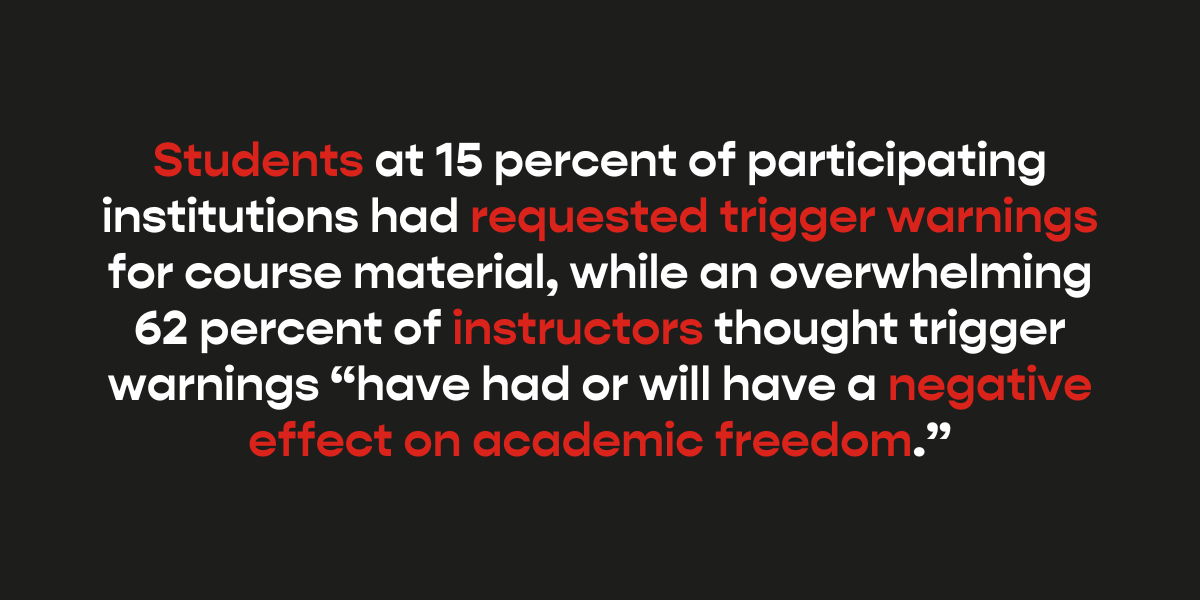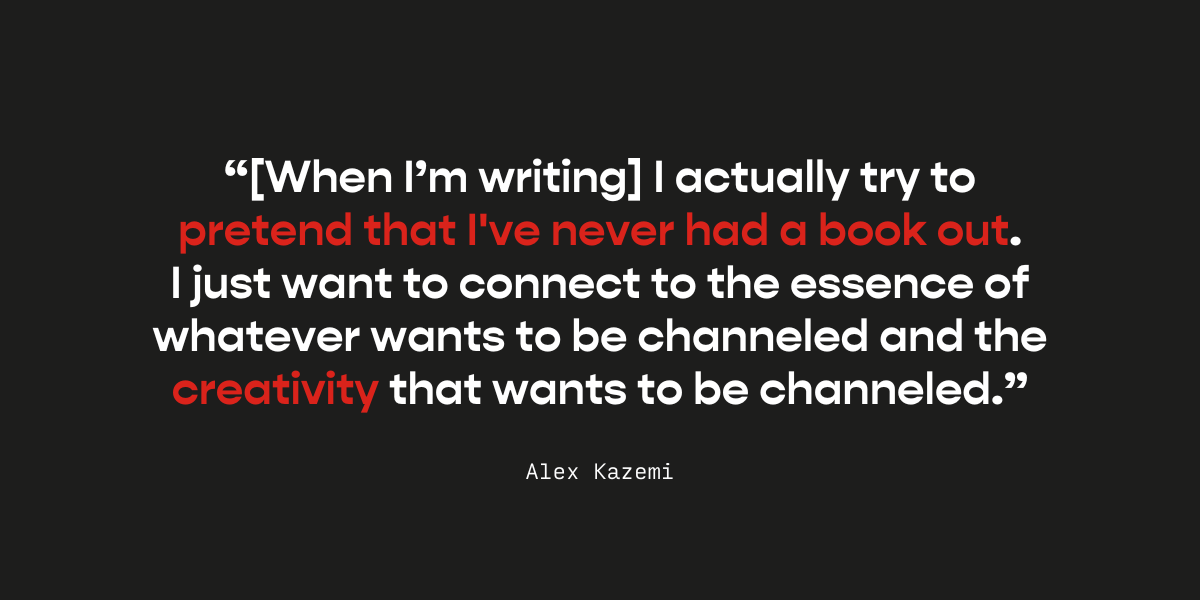Fascism, kidnapping, sexism, slavery, suicide, war, and violence.
These are the trigger warnings provided on the Book Trigger Warnings database for J.R.R. Tolkien’s world-renowned fantasy novel The Return of the King, published in 1955.
Modern literature, such as R.F. Kuang’s Yellowface, published in 2023, receives no less than a sixteen-item extensive list of potentially sensitive topics, including alcohol, anti-queer sentiments, blackmailing, racism, rape, slurs, and suicidal ideology.
You’ve probably seen the note “TW” at the start of a post on the internet. Similarly, trigger warnings have been implemented within the publishing world as a form of protection to help readers identify topics they would rather not encounter. But have trigger warnings offered any real-world benefits?
Dive in as we explore the debate for and against trigger warnings, chat with author Alex Kazemi, who ran into trigger warnings in his latest book, and discover what curated literature means in a world with access to an uncensored internet.
What’s Up with Trigger Warnings?
The concept of trigger warnings originated in the late 1990s. Feminist message boards were known to employ cautionary labels to prevent emotional distress around topics such as sexual assault. Eventually, the concept caught on across the internet, and then started popping up in printed material, too.
Today, content warnings are fairly ubiquitous — and also contentious. Some people proclaim these warnings offer mental health protection, allow for more personal decision-making in reading selection, and provide a greater sense of accessibility. Naysayers point out that trigger warnings could limit artistic freedom, create more homogenized literature, and help people avoid facing difficult yet necessary conversations.
The concept of these content warnings became especially debated on college campuses across the U.S. in the 2010s. Some universities, such as Oberlin College, called on their instructors to include trigger warnings for course material that students could find distressing. Others, like the University of Chicago, put out official statements condemning trigger warnings.
The National Coalition Against Censorship (NCAC) conducted a survey in 2015 that found students at 15 percent of participating institutions had requested trigger warnings for course material, while an overwhelming 62 percent of instructors thought trigger warnings “have had or will have a negative effect on academic freedom.” Yet other professors proclaim trigger warnings help educators, too.
That same year, The Atlantic called this movement on college campuses “the coddling of the American mind.”

Pros: Protecting Mental Health & Reader Choice
The most commonly argued benefit of content warnings is to provide mental health protection for individuals who may have experienced trauma. After all, shouldn't it be the choice of the reader to decide what they wish to ingest intellectually?
Providing readers with a choice and empowering them to make informed decisions allows them to decide whether they wish to engage with the content or avoid it to prevent distress, anxiety, and traumatic flashbacks. For many readers who use literature as a form of escape, this is incredibly beneficial.
For people who have mental health conditions such as PTSD or debilitating anxiety, trigger warnings create a sense of renewed accessibility. Books with trigger warnings can be enjoyed by those who may have avoided literature due to a fear of unknown themes.
Individuals who have mental health concerns may even be able to prepare themselves to cope with the material, a potentially critical step toward improved health.
Cons: Censorship & Avoiding Difficult Topics
While it’s clear trigger warnings were created with good intentions, critics say that imposing such cautions on books could lead to censorship and limited artistic freedom. Authors often explore challenging themes, and the threat of including a trigger warning may be enough to silence their expression for fear of not being published.
The idea of censorship seems like a stretch at first, but skeptics wonder if the widespread use of trigger warnings causes publishers to be more cautious about the material they publish, leading to more sanitized work—a homogenization of literature.
Trigger warnings could also lead to censorship on school or library shelves. In a time of rampant book bans, a bold book that addresses critical topics for youth (think fatphobia, dating abuse, or bullying) could be taken down based solely on its trigger warnings.
Of course, there is the argument proposed by many educators: that this type of literary climate can also prevent complex topics from being discussed. In essence, trigger warnings could push individuals away from challenging books that would actually help to better their mental health — or society itself.
But Do Trigger Warnings Help?
You’ll notice a lot of these conversations occurred nearly a decade ago. After all this time, do we have proof that trigger warnings help?
An analysis by researchers at the College of Education, Psychology, and Social Work at Flinders University says trigger warnings may do more harm than good. Some studies even note that such warnings can cause anticipatory anxiety. From the initial wave of studies conducted, it seems like trigger warnings may themselves be in danger.
Conversely, some individuals, primarily teachers and students who deal with diverse materials as part of their curriculum, note that trigger warnings can be helpful in the classroom — for student and educator. The Harvard Crimsonpublished an article from a student’s perspective that examines the results of the above studies and their “overstated” results.
While some may be quick to point to a published study, one study is not the end-all-be-all for a debate. Trigger warnings are a nuanced topic, with proponents and critics positioned to argue for the foreseeable future.
Chatting with Author Alex Kazemi
To better understand how trigger warnings can affect authors, the Freewrite team sat down with novelist Alex Kazemi to discuss his experience. Alex’s 2023 book New Millennium Boyz was subject to trigger warning discussions.
In New Millennium Boyz, readers follow seventeen-year-old Brad Sela in 2000 (or Y2K, as the book references it). In his Canadian hometown, Brad feels numb and disconnected from his parents when he follows two transfer students into the woods one day, making two new friends — and dealing with dark and dangerous impulses.
The novel is a no-holds-barred exploration of male youth in 2000, full of dark realities and chilling cultural references. However, where darker themes lie, so does the possibility of trigger warnings.
Fiction with a Side of Trigger Warning
"I got a call from my publisher," Alex tells us. "So-and-so is not going to stock [the book] without a content warning because they're really worried about how teenagers are going to react to the work and if they're going to reenact the behavior."
In this era of abundant content, Alex had assumed he had the freedom to express himself without such restriction. Especially because the book is not marketed to teens. It’s shelved in the adult section.
“[The book] is a cultural critique. It's not anything to be glamorized,” he says. “I think anyone who reads it would understand that.”
During the editing process for New Millennium Boyz, an early reader complained to Alex’s publisher about a reference in the book, which included a Columbine shooting victim’s name, a piece of historical information that the characters would have been familiar with in this time period. Alex was shocked when his publishing team took action based on one reader’s complaint.
This shock comes from the perspective of someone who has been online for most of his life. "I just don't understand how we could have that level of censorship for literature," he says. "... the internet is so accessible to everyone and is so uncensored."
It’s clear Alex's unease with the idea of a trigger warning in his book stems from a fear of censorship — the question of whether potential readers will be warned away from his work.
"Where is the line?" he asks. And while he disagreed with the addition of a content warning to his book, he ultimately gave in, for the good of the project. As most writers would.
In fact, for any writer, the important question is this: Who has the authority to decide when the gates are open and when they’re closed?
The answer to that is, of course, your publisher.
Trigger Warnings vs. The Internet
A common thread in our conversation with Alex was the internet. In a world where nearly anyone can access the web and see what they want, do trigger warnings make sense?
"People go on Reddit and read grotesque things," he says. "Yet, when it's presented in literary fiction, it's something to cause alarm bells about."
Those who favor trigger warnings will point out that publishers alone can no longer obtain complete censorship — thanks, in part, to the internet. Independent authors garner plenty of attention without traditional publishers, using predominantly digital means.
Even Alex admits, "You can go on TikTok and see a self-published horror author who has 10,000 Goodreads reviews and millions of hits on their book. It's not like back in the day when you're like ... I need a publishing house. It's not like that anymore.”
For those concerned about trigger warnings causing mass censorship and homogenizing literature, thanks to the internet, that may never be the case.
Perhaps there is a credible threat of the publishing industry homogenizing itself, but there will likely always be other options for writers and readers.
Focusing on Equal Access to Literature
Alex made it clear that he is focused on liberating information and literature, echoing common industry concerns. New Millennium Boyz ended up on the radar of a book banning site supposedly run by parents, despite the book — again — not being marketed to young people.
"Book bans are really ridiculous," Alex says. "Moms call libraries, they post on Facebook groups, they really start to create this hyper-vigilance around books…I don't think we should be censoring [books]."
With the ease of access to online material, are those interested in banning books wasting that effort?
"It just seems weird to put your effort into getting these books banned from an institution rather than talking to your kid, talking through these things they are most definitely going to see and encounter in the real world."
Regarding Alex's book potentially being banned from libraries, he continues, "I don't think New Millennium Boyz could ever even be in a teen library because of how explicit it is…”
But, even on the adult shelf, it earned a trigger warning.

The Freedom to Create
A key question we had for Alex was whether his experience with his publisher and trigger warnings would affect how he wrote his next book.
Are his thoughts on censorship a self-fulfilling prophecy that will derail him the next time he sits down to write?
"No, no, that's not on my mind,” Alex tells us. “I actually try to pretend that I've never had a book out… I just want to connect to the essence of whatever wants to be channeled and the creativity that wants to be channeled."
Other writers may not find it so easy. But for Alex, divorcing your creative process from how the work will be received is crucial.
And that’s the important thing, isn’t it? Whether you believe trigger warnings are a proactive means of protecting readers or are concerned about potential censorship, we hope you sit down to write today.
Subscribe to our free newsletter to stay abreast of the literary world and learn how to continue to challenge your creativity daily.





















